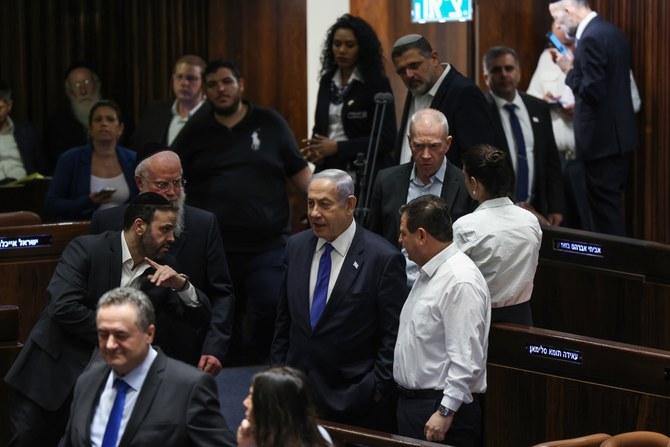Palestinians a glaring omission from debate on Israeli democracy

https://arab.news/9e2bw
A week ago, in defiance of mass protests, 64 members of the Israeli Knesset landed their first blow on the Israeli judiciary. This dramatic onslaught on the Israeli political system has even attracted criticism from the US president. But what is extraordinary is that those who may land up being the greatest victims of this political vandalism — the Palestinians — barely get a mention.
The conventional narrative is merely that Benjamin Netanyahu et al want to protect themselves. The beleaguered prime minister, as weak as he ever has been in more than 15 years in power, is determined to avoid jail. He has been indicted on three charges. Added to that, Netanyahu may wish to restore former Interior Minister Aryeh Deri to that role after the Supreme Court had deemed his appointment as “unreasonable in the extreme,” owing to his 2022 conviction for tax fraud. But these are minor issues compared to the bigger picture.
Israeli Jews have plenty to protest about, particularly those of a democratic or liberal bent. It is an assault on the rule of law and the independence of the judiciary. This is the vital third pillar in the Israeli political system and every effort should be made to prevent it becoming subservient to the executive and the legislature.
For 30 weeks, hundreds of thousands of Israeli Jews have made their voices known. Their struggle is laudable. They have faced down Israeli police who have been willing to use force to restrain them, albeit only a fraction of that deployed whenever Palestinians dare to engage in nonviolent protest.
It is a contest of power that is bound to continue. It will determine the trajectory of Israel’s future, to what extent it will become more akin to a theocracy. The secular business world of Israel, largely along the coast, is up against the more religious-nationalist sector, which is mostly found in Jerusalem and the settlements.
For Palestinians, the talk of Israeli democracy means nothing; it is a fantasy, a sick joke
Chris Doyle
What much of the media fails or refuses to grapple with is the extent to which the Palestinian citizens of Israel are totally uninvolved, as well as the degree to which much of this judicial sabotage is driven by the settler movement and those who wish not just to perpetuate the occupation but to eradicate the Palestinians as a meaningful political presence in the Occupied Territories.
Palestinian citizens of Israel simply do not regard the Supreme Court as being for their benefit. Yes, they will use it, but burdened with low expectations. As for Palestinians from the Occupied Territories, whenever they opt for the Supreme Court, they encounter an occupier’s law, with the odds stacked against them. At best, they can delay a proposed eviction or land confiscation. They experience no justice and no “reasonableness.”
The wider world refuses, for the most part, to acknowledge the systemic discrimination Palestinians endure, whether in the Occupied Territories or even inside Israel. For Palestinians, the talk of Israeli democracy means nothing; it is a fantasy, a sick joke.
But perhaps what is more startling is the misreading by the outside world of why this is happening. In fact, some of the Israeli protesters are only now just beginning to understand this, or are perhaps beginning to admit to themselves what they have always known.
Occupation and annexation lie at the heart of these moves. Skeptical? Yariv Levin, the Israeli justice minister and architect of this judicial assault, was very clear from the podium in the Knesset. He picked out five examples of when the Supreme Court had acted unreasonably. Did he cite one example that related to the inner workings of Israel? No. All five of his examples related to Israel’s treatment of Palestinians — two about Palestinian entry into Israel, including a decision to overturn the denial of entry into Israel of a Palestinian American student who backed the Boycott, Divestment and Sanctions movement; one about stopping an Israeli army decision to expel three Palestinians; and the final two related to Israeli activists who sought to challenge the occupation.
Levin and the others who back this assault have not been shy in explaining their reasons. The Supreme Court, never a champion of Palestinian rights and frequently part of the oppression, has, for these extremists, become an obstacle. It has typically given a stamp of approval to illegal activity.
The settlers and their supporters crave more Palestinian land and fewer Palestinian people. They are impatient. Their extremism has even led Tamir Pardo, a former head of Mossad, to compare the Israeli right, including those in government, to the Ku Klux Klan.
The settlers and their supporters crave more Palestinian land and fewer Palestinian people
Chris Doyle
Levin, alongside Netanyahu, wants the formal annexation of the West Bank. Palestinians will formally become noncitizens in the state of Israel, allowed to continue to exist in semi-autonomous Bantustans. The forced displacement of Palestinians from rural areas into crowded cities will be accelerated. In recent months, three Palestinian communities have decided to abandon their villages because the settler violence and aggression had become too much.
The Supreme Court is slow as far as the settlers are concerned. It means delays. Legal arguments take time. Take Masafer Yatta in the South Hebron hills. The settlers have been fighting to get the Supreme Court to evict more than 1,000 families for years. Of course, they did eventually win in May. At some point, the Israeli army will forcibly evict them. International pressure has, like the Supreme Court, on occasions acted as a temporary brake. The same could be said for many Palestinian communities in Silwan, Sheikh Jarrah and Khan Al-Ahmar, to name just a few. Inside Israel, a court ordered a community of 500 Bedouin to leave their unrecognized village of Ras Jrabah in the Negev.
Another current far-right initiative is to pass a law that would prevent the Supreme Court from overruling the Knesset elections committee. What has the elections committee consistently done? Made decisions to ban Palestinian parties, which the Supreme Court has then rejected.
It is time for a more informed and honest debate. Israel has only ever had a chimera of democracy. How could it be a democracy while enforcing military law on Palestinian populations in Israel until 1966, maintaining a settler-colonial regime in the Occupied Territories since 1967, and passing a whole bevy of laws privileging Jews above non-Jews and discriminating against Arabs?
- Chris Doyle is director of the London-based Council for Arab-British Understanding. He has worked with the council since 1993 after graduating with a first-class honors degree in Arabic and Islamic Studies at Exeter University. He has organized and accompanied numerous British parliamentary delegations to Arab countries. Twitter: @Doylech










































